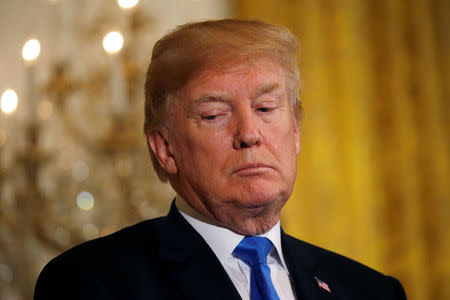Trade threats trump data as growth fears emerge
By Padraic Halpin
DUBLIN (Reuters) - Just last month nervy investors were glued to their screens for the release of inflation data from the world's advanced economies after fears of a faster than anticipated return of price growth rocked global stock and bond markets.
However inflation readings next week from the likes of Germany, France and Italy will take a distance second place to fears of a trade war between the world's two largest economies that has sent a further shiver through financial markets.
China urged the United States to "pull back from the brink" on Friday as President Donald Trump's plans for tariffs on up to $60 billion (£42.5 billion) in Chinese goods prompted concern among investors of potential dire consequences for the global economy.
After Trump also continued a national security shake-up that takes his foreign policy in a more hawkish direction, Eurasia Group President Ian Bremmer remarked on Twitter that it was "probably the worst/biggest single day for geopolitical risk" since he founded the political risk firm in 1998.
Rhetoric rather than economics could be the main driver of sentiment in the short term, as suggested by Germany's bellwether Ifo Institute March survey that showed business confidence at its lowest level in nearly a year on protectionism concerns.
While Beijing retaliated with tariff plans of its own on Friday, one European Union leader said the EU's temporary 40-day exemption from U.S. import duties on steel and aluminium was like Trump "putting a gun to our head."
"There is hope of a favourable outcome, given what happened during the trade dispute between the US and Japan in the 1980s, which has many parallels with the current situation and which ultimately did not escalate," Commerzbank economists Christoph Balz and Bernd Weidensteiner wrote in a note.
"However now, unlike then, the conflict with China is also about demonstrating political muscle so economic considerations may take second place."
GLOBAL SLOWDOWN?
The rising threat of protectionism comes just as some economists sense that the global recovery is near the top of its economic cycle.
In a note titled 'Global growth – is it slowing?', BNP Paribas Chief Market Economist Paul Mortimer-Lee argued that there are some signals that global growth - recently revised up to 3.9 percent by the IMF for both 2018 and 2019 - may be peaking or easing back.
Mortimer-Lee points to Purchasing Managers surveys in some advanced economies that have declined recently, along with some of the OECD's leading indicators and the volume and price of Korean semiconductor exports, viewed as a leading indicator of global trade by BNP.
"Overall, it looks like there are a number of signs of a slower pulse going forward for global growth. That makes protectionism all the more concerning," he said.
"However, we'd like to see some Q2 data because Q1 data sometimes tend to be weak due to weather and holidays. At the moment there is a suspicion of a slower pace, but no confirmation."
Such suspicions won't be much of a feature in backward looking revisions to Q4 GDP figures for the U.S. and Britain next week, while March inflation data for Germany, Italy and France land on Thursday and Friday.
South Africa's Reserve Bank also meets on Wednesday and is expected to cut its repo rate by 25 basis points to 6.50 percent, according to a Reuters poll of economists.
(Reporting by Padraic Halpin)

 Yahoo News
Yahoo News 


